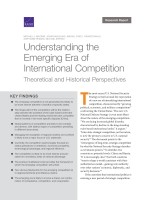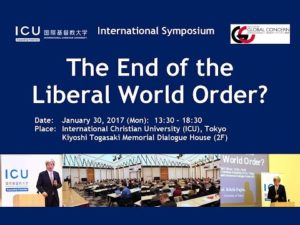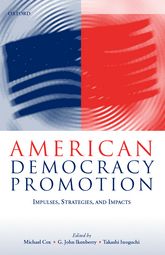 A new era of great power competition pitting authoritarian revisionists against “value-sharing democracies” is one of the scenarios outlined in a new RAND report, Understanding the Emerging Era of International Competition: Theoretical and Historical Perspectives.
A new era of great power competition pitting authoritarian revisionists against “value-sharing democracies” is one of the scenarios outlined in a new RAND report, Understanding the Emerging Era of International Competition: Theoretical and Historical Perspectives.
“The hinge point of the competition will be the relationship between the architect of the rules-based order (United States) and the leading revisionist peer competitor that is involved in the most specific disputes (China),” say authors Michael J. Mazarr, Jonathan Blake, Abigail Casey, Tim McDonald, Stephanie Pezard, and Michael Spirtas. “Two obvious flashpoints for the emerging competition lie in regional territorial and influence claims and in the growing tendency of authoritarian states to seek to extend their reach and control beyond their borders.”
“The sources of competition lie in a few identity-asserting major powers determined to achieve key regional goals while pushing back against U.S. predominance and the disproportionate U.S. influence in setting global norms,” they add. “As a result, the United States will continue to have the opportunity, if it chooses, to lead a predominant coalition of value-sharing democracies and other largely status quo states to help preserve stability.”
The new competitive era “is likely to involve a drawn-out combination of contestation, competition, and cooperation in which ‘winning’ or ‘victory’ is the wrong mental model,” the paper adds. “The mindset for the emerging era should be more of management than of something to be won. This same mindset is likely to be required on many subsidiary challenges — the contest against extremism, global trade disputes, and others.”
 Democracies will enjoy systemic advantages over their autocratic rivals, the paper suggests.
Democracies will enjoy systemic advantages over their autocratic rivals, the paper suggests.
“Notwithstanding the constraints on their revisionism, Russia and China (and, to a lesser degree, Iran) all share an important characteristic that defines the nature of the challenge they pose: Their governance models do not take seriously the sort of public-private distinctions, or elaborate principles of rule of law, that are so central to most liberal democracies.”
The challenge revisionist China and Russia pose to the democracies and the international order “stems in significant measure from this essential mismatch,” the authors contend:
Value-sharing democracies are confronting competitors who combine economic competition, intelligence operations, cyber meddling, political manipulation, information campaigns, and many other tools in ways that democracies are institutionally (and sometimes constitutionally) incapable of matching. The challenge, from China at least, is unique among current challengers: This is the single case in which the United States is confronted with a highly competent, economically dynamic country that, at least in theory, can employ every actor in the society as part of a coordinated strategy.
The RAND analysts argue that “the multilateral institutions, forums, and norms as mechanisms by which value-sharing democracies and other stability-seeking states seek to temper emerging competitive dynamics and, in some cases, constrain and deter revisionist states…..represent a significant U.S. and allied competitive advantage, inasmuch as China, Russia, or Iran do not currently serve—or have the prospect of serving—as the leading hub of such a network.”
World’s most ardent revisionist?
 “Although the United States has been the predominant status quo power since 1945…..it has also, especially since 1989, arguably been the world’s most ardent revisionist,’ the RAND analysis asserts:
“Although the United States has been the predominant status quo power since 1945…..it has also, especially since 1989, arguably been the world’s most ardent revisionist,’ the RAND analysis asserts:
This has been true in areas of norms and values rather than territory: American revisionism has sought to spread democracy (including to the Soviet Union during the Cold War but also through military interventions in Iraq and elsewhere), neoliberal economic models (including through stringent conditions applied by international economic institutions), and more. Many other countries see the United States, with its advocacy of liberal values through example and sometimes coercive force, as the most disruptive force in the international system.
“The alternative norms favored by Russia and China would not, at least on their face, lead in the direction of an anarchic system. Both believe that the promotion of liberal values, insofar as they threaten and impose conditions on state sovereignty, violates the foundational norm of the postwar order,” the paper adds:
Territorial integrity as expressed in the inviolability of state sovereignty. They advocate for a “Westphalian” order built on a base of sovereignty rather than a “post-Westphalian” order based on such concepts as the Responsibility to Protect and forcible humanitarian intervention. In this argument, the two countries are in fact joined by most emerging democracies, including India, Brazil and Indonesia, which oppose forcible value promotion and share a commitment to a largely Westphalian order.







